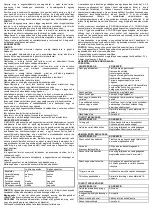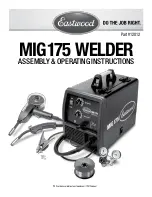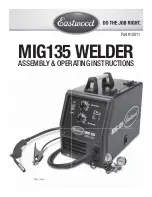
2.5. WHEEL KIT ASSEMBLAGE (OPTIONAL)
Some models are equipped with a wheel kit containing:leg, gas bottle
support, axle, gas bottle holder, chain, handle extension, wheels, axle
caps. See the picture to mount the kit.
3. SPOOL WIRE AND TORCH INSTALLATION
3.1. SPOOLS INSTALLATION
The models can indifferently mounth the ø100 and ø200 mm spools. The
hub is predisposed with a clutch in order to always maintain the wire stiff.
ø
100
ø
200
3.2. WIRE-FEEDER MOTOR
Make sure that the size of the groove in the feed roll corresponds to the
welding wire size being used. The feed roll has the wire diameter
stamped on its side. The machines are equipped with proper shagreneed
rolls suitable for welding with flux cored wire without gas protection. To
weld with full wire with GAS protection you have to replace the roll of the
wire feeder group which has
V
form for the steel wire and
U
form for the
aluminium wire. If you intend to use the welder with gas protection you
have to require such rolls and the pressure reducer to your retailer or to
the builder society.
3.3. FEEDING WIRE INTO THE WELDING TORCH
1. Release the Spring Loaded Pressure Arm (1) rotate the Idle Roll Arm
(2) away from the Wire Feed Drive Roll (3). Ensure that the groove size
in the feeding position on the drive roll matches the wire size being used.
2. Carefully detach the end of the wire from the spool. To prevent the
spool from unwinding, maintain tension on the wire until after step 5.
3. Cut the bent portion of wire off and straighten the first 10 cm.
4. Thread the wire through the ingoing guide tube (4), over the drive roll
(3), and into the outgoing guide tube (5).
5. Close the idle roll arm and latch the spring loaded pressure arm (2) in
place. Rotate the spool counterclockwise if required to take up extra
slack in the wire.
6. The idle roll pressure adjustment wing nut is normally set for mid-
position on the pressure arm threads. If feeding problems occur because
the wire is flattened excessively, turn the pressure adjustment counter-
clockwise to reduce distortion of the wire. Slightly less pressure may be
required when using 0,6 mm wire. If the drive roll slips while feeding wire,
the pressure should be increased until the wire feeds properly.
7. Remove gas nozzle and contact tip from end of gun.
8. Turn the machine ON (“I”).
9. Straighten the gun cable assembly.
10. Depress the gun trigger switch and feed welding wire through the gun
and cable. (Point gun away from yourself and others while feeding wire.)
Release gun trigger after wire appears at end of gun.
11. Turn the machine OFF (“O”).
12. Replace contact tip and gas nozzle.
13. Cut the wire off 6
– 10 mm from the end of the tip. The machine is
now ready to weld.
3.4. TORCH CONNECTION
The torch is connected directly to the welding machine so it is ready for
use. A probable replacement of the torch must be done with care and if
possible by a technician. To replace contact tips, it is necessary to
unscrew or to pull it. Replace tip, check that it corresponds with the wire
size and replace the gas shroud. For good wire feeding during welding
operations, it is essential that the correct size parts are used for each
wire. Keep always clean the contact tip.
4. WELDING MODE
4.1. CONTINUOUS WELDING
It is the mode in which the welding machine is likely to be used the most.
In this mode, you have only to press the button of the torch and the
welding machine begins to work. To stop welding it is necessary
releasing the torch button.
4.2. GAS PRESSURE
Gas pressure should normally be set to give a reading between 6 / 12
litres per minute on the flowmeter. Anyway, every operator will find what
suits him the most with his type of work and can make the necessary
adjustment.
4.3. GAS
– NO GAS WELDING MODE
4.3.1. Gas
- Connect torch clamp to positive terminal
(+)Dince Righ
and
earth clamp to negative
(-)Dince Left.
4.3.2. No gas
- (only for preset models) Connect earth clamp to positive
terminal
(+)Dince Left
and the torch clamp to negative
(-)Dince Right.
4.4. MIG - MAG WELDING MODE
A ) MIG
=
M
etal
I
nert
G
as
B ) MAG
=
M
etal
A
ctive
G
as
These two modes are perfectly equivalent, the difference is given by the
kind of gas you use. In case A the gas employed is ARGON ( inert gas).
In case B the gas employed is CO
2
( active gas). To weld alluminium
alloys you need use ARGON (100%), to weld steel it is enough a
compound of ARGON 80% and CO
2
20%. You can only use CO
2
in case
you will weld iron.
5. WELDING GUIDE
5.1. GENERAL RULE
When welding on the lowest output settings, it is necessary to keep the
arc as short as possible. This should be achieved by holding welding
torch as close as possible and at an angle of approximately 60 degrees
to the workpiece. The arc length can be increased when welding on the








































